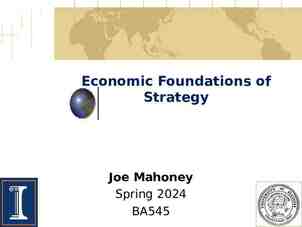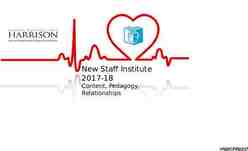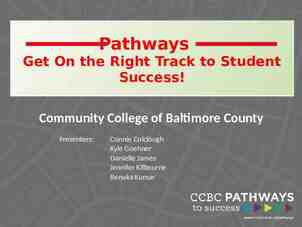Doctor of Business Administration and Professional Doctorate By Tom
13 Slides131.89 KB

Doctor of Business Administration and Professional Doctorate By Tom Amonde 16 May 2019

The UoS’s DBA /DProf. at UCC? A Doctorate Work-based Profession / Practice based Academic input Research Degree Tailored for Jamaica 16 May 2019

The Nature of the DBA and the DProf (Maxwell, 2008) The Profession The Workplace DProf Academic Theory

Key things to remember: What you are doing in your workplace at the moment (no matter how good) is not enough, because for the doctorate you are expected to do three key things (my‘trinity’ rule): Produce NEW knowledge through systematic enquiry (i.e. recognised methodology) academically underpinned (i.e. academic literature) Your professional work will be the vehicle and is likely to provide you with much of the data for your doctorate, but you have to develop it to doctoral level 16 May 2019

This is a long, exciting and Is it worth it? At the end, you will be one of a very rare breed that can bridge the professional/academic divide You will be skilled in evidence-based practice You will be able to think creatively, innovatively, and inter-professionally You will develop/enhance your academic status 16 May 2019

DBA/DProf UNIVERSITY programmes: Cross-faculty Cohort-based Portfolio-based Taught element Flexibility part-time work-based learning

THE UNIVERSITY OF SUNDERLAND MODEL FOR DBA/DPROF

Programme Structure Framing Professional Identity 30 Cr (M) Contextualisation and Planning 60 Cr (D) Practice-based Research 1 30 Cr (M) 6 Months 6 Months Critical Debate in Professional Practice 30 Cr (D) DBA and Dprof Research phase 360 Cr (D) Practice-based Research 2 Thesis/ 6 Months 18-54 Months

The DBA/DProf Team Programme Leader John Fulton Assoc Programme leader Dirisa Mulindwa Tom Amonde Module Leaders Catherine Hayes Susan Mandala Kim Gilligan Alastair Irons Dirisa Mulindwa 16 May 2019 Chair of Boards Prof Mark Davies Administrator Ms Julie Little External Examiner Prof. Carol Costley

Duration of each Work-based learning Part-time On average 3-4 years; max. 7 years 16 May 2019

Learning approaches –Study Blocks which are interactive and based on dialogue –the use of an e-learning environment –Work based development –Individual advice –Personal development, self direction and motivation –Peer Support. 16 May 2019

Supervisors Two supervisors from UCC and UOS as appropriate to your area of study. They will have been chosen for their subject expertise and their experience of supervision. The ‘first’ supervisor is called the ‘Director of Studies’, and the second is the ‘Co-supervisor’ 16 May 2019

Make it the ‘trinity’ rule: New knowledge Through systematic Academically underpinned enquiry 16 May 2019






